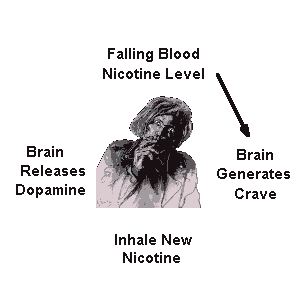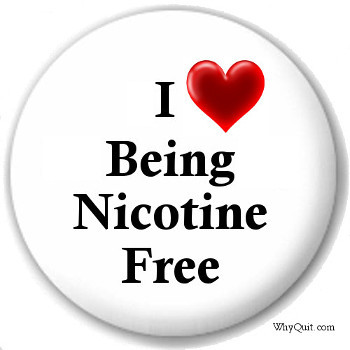Avoid crutches
A crutch is anything that is leaned upon so heavily in supporting recovery that if quickly removed would likely result in relapse.
Does it make sense to lean heavily upon a quitting buddy who quit at the same time as you?
If not schooled in nicotine dependency recovery, their odds of successfully remaining free for a year are relatively small.
Instead, ask an ex-user or never-user for support, or visit free online support forums such as Turkeyville on Facebook: facebook.com/groups/whyquit/
Avoid oral crave coping
Oral coping is a form of crutch substitution. Imagine the possibility of oral substitution causing use conditioning to survive for weeks, months or years after nicotine use ends.
While water provides a subtle and healthy "aaah" sensation, what would happen if water had become your mind's primary crave coping response and it was suddenly unavailable when a crave arrived?
Water is healthy and calorie-free. I fell in love with it. However, be careful that it doesn't become your go-to crave defense.
Any oral coping strategy that imitates nicotine use, or the handling of any object that imitates your nicotine delivery device, should be avoided.
Imitating any addiction-related behavior helps maintain that behavior, may delay suppression of old use memories, invite use fixation, prolong recovery, and thus elevate risk of relapse.
Reaching for food as an oral crutch can obviously add extra demoralizing pounds. If you find yourself headed for the kitchen, take aim at healthier foods.
Can you eat an entire apple in 3 minutes? If so, that's 80 calories and 4 grams of fiber.
With more than half of all relapses associated with alcohol or other drug use (52 percent), the only worse oral crave coping strategy is reaching for nicotine gum, nicotine lozenges, or any other substitute form of nicotine delivery.
If you find yourself reaching for something more substantial than a toothpick or toothbrush, make sure it isn't fattening, that it will always be available within seconds, and is something you'd be able to do anywhere, and anytime, for years to come. The only thing that meets that definition is slow deep breathing.
The smoking dream
It is entirely normal to experience nicotine use dreams now and then, especially during early recovery.
If a former tobacco user, be prepared for an extremely vivid nicotine-use dream as tobacco tars released by horizontal healing lungs come in contact with vastly enhanced senses of smell and taste.
I’ve had roughly a half-dozen use dreams since breaking free 24 years ago. Although horrifying, what’s amazing is that after 30 years of heavy smoking, I haven’t experienced far more.
Although I haven’t had one in years, they’re vivid reminders of the amazing journey I made.
Remember, we're safe so long as our use dreams remain nightmares. In that regard, they’re protective and good, not bad.
Reward yourself
Visualize, feel and celebrate your gains.
Consider putting aside the money that you would have spent buying nicotine and after a week or month, treating yourself to something you really want. Save for a year and go on a vacation.
See nicotine marketing as bait
Your recovery means thousands of dollars in lost profits to the neo-nicotine industry. "Big Nic" doesn't want to lose you.
Get mad! See store advertising and the hundreds of neatly aligned packs, cartons, tins and vaping products for what they truly reflect—bait.
Hidden inside the pretty colored packs and among the hundreds of flavor additives is what many dependency experts consider earth's most captivating chemical.
Don't be afraid to visit the store where you purchased your supply. Unless it’s a nicotine or tobacco specialty shop, you’ll likely need to meet, greet and defeat that trigger too.
While there, look for the warning to teens and young adults that nicotine is extremely addictive. Sadly, there is none.
Healthy support expectations
Is it fair to expect family and friends who've never been chemically dependent themselves to have any appreciation of the challenges or time required to achieve substantial comfort?
Instead, find a recovered nicotine addict and ask them if they'd mind being your mentor for the next 90 days. You can also join recovery support groups such as WhyQuit's Turkeyville on Facebook.
Watch nicotine addicts closely
Users don't vape, smoke or chew to tease you. They do so because they must, in order to replenish a constantly falling blood-serum nicotine level that declines by roughly half every two hours.

Most refueling occurs while on autopilot. What cue triggered the public feeding you're now witnessing?
Watch acid-producing events such as stress or drinking alcohol reduce the time between feedings as the user’s kidneys speeds up removal of nicotine from their bloodstream.Witness their endless mandatory need-feed cycle of replenishment.
Thinking vs. wanting
There is a major distinction between thinking about recovery and wanting to use. For example, here you are reading about using and it’s highly likely that, before I mentioned it, you weren’t wanting.
After years of using, it’s totally normal to notice every using addict you see. But, doing so doesn't necessarily mean that you want to.
As for thoughts of wanting, with each passing day, they'll gradually grow shorter in duration, generally less intense, and a bit further apart.
Non-user or ex-user?
What should you call yourself? It’s understandable that you’d want to see yourself as a non-user. But there’s a major distinction between a never-user and an ex-user. Only the ex-user can grow complacent, use nicotine, and relapse.
"My name is ______ and while I'm a non-user, I prefer to refer to myself as an ex-user because it reminds me that I'm just one hit of nicotine away from destroying one of the greatest accomplishments of my entire life."
Avoiding complacency
Complacency is self-satisfaction accompanied by unawareness of danger that is close by.
Easy Street becomes so easy that complacency is normal. Unfortunately, if allowed, it can destroy our healing and glory.
The ingredients for relapse include: (1) a failing memory of why we stopped, (2) forgetting the early recovery challenges or Smart Turkey helping make it too easy, (3) forgetting or rewriting the "Law of Addiction" so as to exempt or exclude ourselves, and (4) an excuse such as stress, celebration, illness, finances, weather, terrorism, war, death, or even a cigar at the birth of a baby.
Whether daily, monthly or just once a year, our recovery benefits from nurturing and care.
But, where do we turn to if use and recovery memories have been suppressed and we kept no diary or record to refresh our recollection?
A few suggestions: Consider keeping your "reasons" list pasted on the fridge, visit an online recovery site, celebrate each anniversary, interview users, re-read Smart Turkey, or visit and explore WhyQuit.
Remember, everyone we love is destined to die. Relationships end, terrorists attack, wars occur, politics will always be taxing, and earthquakes, fires, floods, hurricanes and tornados kill.
Still, even when mom or dad dies, there is no legitimate excuse for relapse. None!
As for this attempt possibly being easier than ever, every attempt and every person is different. There’s no guarantee that next time wouldn’t be your hardest ever, or that you’ll ever come this far again.
Protect your recovery as though your freedom permanently depends on it. It may.
Relapse
Remember that there are only two good reasons to use nicotine once free.
1. You decide that you want to go back to your old level of consumption (or more) and devote each waking hour of the rest of your life to use of a destructive insecticide (Google "neonictinoids").
2. You decide that you really enjoy withdrawal and you want to make it last forever.
Only one rule
So long as neither option appeals to you, there is one guiding principle that will 100% guarantee your freedom: No nicotine just one day at a time, to never take another puff, vape, pouch, dip or chew!
If Smart Turkey was helpful, please share it with others. Together, just one user at a time, we can make a difference.

All rights reserved
Publication date: May 4, 2021
